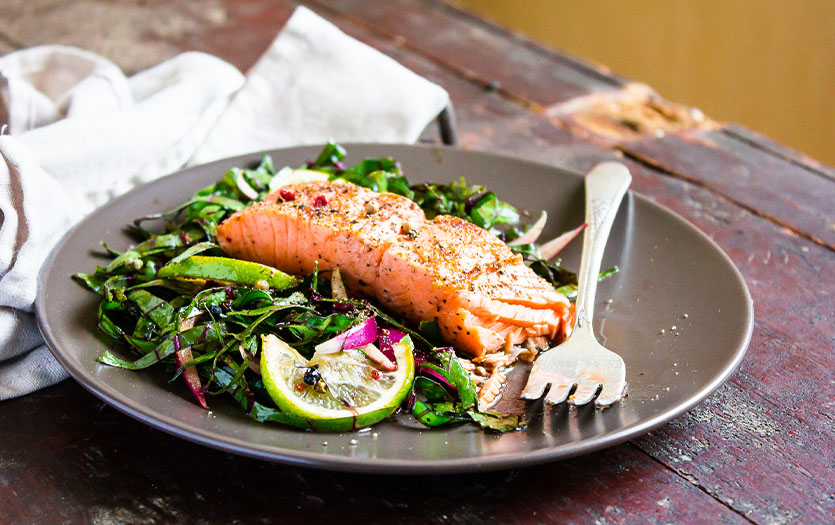
This post was written based on a presentation by Lydia Conner, RDN, LD, community outreach dietitian, The Parkview Center for Healthy Living.
There’s no shortage of diets that claim to “work,” when aiming for a desired result. The problem is that they typically aren’t sustainable or, in many cases, healthy. Heart disease is the leading cause of death in our country, and the things we eat play a major role in the prevention, treatment and management of cardiovascular conditions. When it comes to the foods you consume, from a health perspective, you can’t go wrong by looking toward the Mediterranean.
What is The Mediterranean Diet?
The Mediterranean Diet, based on the eating habits of countries around the Mediterranean Sea, is considered to be one of the best to adopt. While you won’t find the exact same diet in each country, there are typically some important commonalities, including:
An emphasis on
- Vegetables
- Fruits
- Whole grains
- Beans
- Legumes
- Non-tropical vegetable oils (olive oil)
- Nuts and seeds
- Plant-based foods
In moderation
- Fish
- Poultry
- Eggs
- Low-fat or fat-free dairy products
- Wine
Very limited amounts of
- Added sugars
- Sugary beverages
- Sodium
- Highly processed foods
- Refined carbohydrates
- Saturated fats
- Fatty or processed meats (red meat)
The Mediterranean Diet and your heart
According to the American Heart Association, “Year after year, the Mediterranean Diet comes out on top in the U.S. News and World Report annual ranking of best diets. A panel of experts judges various eating plans and popular diets on criteria including how healthy they are, how well they work and how easy they are to follow.”
One of the major benefits of the Mediterranean approach to eating is that it is packed with fruits, vegetables, whole grains, beans and legumes. These plant-based foods provide:
- Fiber – Soluble fiber can lower serum cholesterol.
- Potassium – Relaxes blood vessels, lowering blood pressure.
- Antioxidants – Help the body fight inflammation and cell damage, some may help to prevent blood clots.
Focus on fats
Another strong aspect of plant-forward eating is that it helps reduce the amount of saturated fat you are consuming, as well as the total amount of fat in your diet. The trick here is to avoid processed plant-based foods, which can have higher amounts of saturated fats, sodium, sugar, etc. in them.
When it comes to focusing on healthy fats, consider that liquid oils are typically better for your heart, especially if they are from a whole food source. Some of these healthy fats can even lower cholesterol. Shift to using:
- Nuts and nut oils, seeds and seed oils
- Avocadoes and avocado oil
- Olives and olive oil
And avoid these sources of saturated fat that can raise cholesterol:
- Meat
- Dairy
- Processed foods
- Tropical oils such as coconut and palm oils
The not-so-sweet stuff
Part of following a Mediterranean Diet is limiting sugar, sodium and highly processed foods, which are all consumed in excessive amounts in the typical American diet and linked to inflammation and heart disease.
If this feels restrictive or overwhelming, try these simple shifts in thinking and habits:
- Always read nutrition labels.
- Cook at home more and eat out less.
- Consume fresh foods frequently.
- Keep portion sizes in check and practice mindfulness around eating.
Avoid the “all-or-nothing” mindset
Many diets fail because they aren’t realistic, enjoyable or sustainable. Making a lasting change should start slow and steady. Set one SMART goal at a time and settle into one habit change before adding anything new to the mix.
Tackling multiple goals at once can be overwhelming, especially if many of your habits haven’t been reinforced in your lifestyle. Focus on one thing at a time. Every minute is a new opportunity to listen to your body and honor your health.
Sustainable changes need to be enjoyable and satisfying, leaving you with a positive feeling about the change vs. feeling restricted or defined by the diet/lifestyle. Ask yourself if the nutrition changes are something you feel is realistic to maintain? If not, what will get in the way of your adherence to the change? Based upon the previous answers, do you need to tweak an already-implemented change for more satisfaction/confidence before adding in an additional change? There’s nothing wrong with that, if it ultimately gets you where you want to go down the road.
Taste the Mediterranean
Chickpea Salad with Avocado, Tomato and Cucumber
Salad
2 medium tomatoes, diced
1 avocado, diced
1 cucumber, diced
¼ cup red onion, sliced
15-ounce can of chickpeas, drained and rinsed
Dressing
¼ cup olive oil
2 tablespoons lemon juice
¼ cup parsley, chopped
¼ cup basil, chopped
Salt and pepper, to taste
- In a large bowl, combine the salad ingredients.
- In a medium bowl, combine the dressing ingredients. Stir or whisk to combine.
- Pour the dressing over the salad. Toss to combine. Season with additional salt and pepper, to taste, if desired.
Recipe adapted from Juliasalbum.com.




